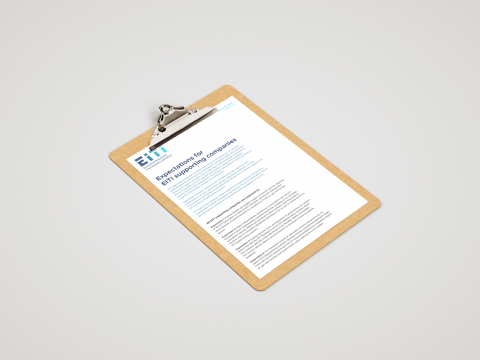
Section 4 of Part 1 of the 2023 EITI Standard
This section sets out the expectations that companies are committed to observing when they support the EITI.
EITI supporting companies recognise that increased transparency can promote understanding of natural resource management; strengthen public and corporate governance; reduce corruption; and provide data to inform greater transparency and accountability in the oil, gas and mining sectors. Supporting companies, working together with governments and citizens, aim to deliver natural resources in a manner that benefits societies and communities.
Supporting companies uphold the EITI Standard through reporting in EITI implementing countries where they operate. Supporting companies are also encouraged to participate in multi-stakeholder groups and to actively engage in the EITI process in implementing countries.
EITI supporting companies further support EITI implementation through their membership in the EITI Association, by meeting this set of Expectations and an annual financial contribution to the international management of the EITI.
All EITI supporting companies are expected to:
-
Expectation 1: Publicly declare and publish support for the EITI and the objective of the EITI Association to make the EITI Principles and the EITI Standard the internationally accepted standard for transparency in the oil, gas and mining sectors.
-
Expectation 2: Make comprehensive disclosures in accordance with the EITI Standard in all EITI implementing countries where the company or its controlled subsidiaries operate. Where not disclosed in other company reporting, publicly disclose a list of controlled subsidiaries operating in the oil, gas or mining sectors in EITI implementing countries.
-
Expectation 3: Publicly disclose taxes and payments to governments at a project-level in line with the EITI Standard in all non-EITI implementing countries where the company operates unless disclosure is not feasible. Where not feasible, the country-specific legal or practical barriers to disclosure should be publicly explained.
-
Expectation 4: For companies buying oil, gas and/or mineral resources from the state in EITI implementing countries, disclose volumes received and payments made in line with the EITI Standard and the EITI reporting guidelines for companies buying oil, gas and minerals from governments, unless disclosure is not feasible.
-
Expectation 5: In line with the EITI Standard, publicly disclose audited financial statements, or the main items (i.e. balance sheet, profit/loss statement, cash flows) where financial statement are not available.
-
Expectation 6: Publicly declare and publish support for beneficial ownership transparency and publicly disclose beneficial owners in line with the EITI Standard, recognising that listed companies will disclose the name of the stock exchange(s), include a link(s) to stock exchange filings where they are listed and otherwise do what is required by applicable regulations and listing requirements.
-
Expectation 7: Engage in rigorous due diligence processes and publish an anti-corruption policy setting out how the company manages corruption risk, including how the company collects and takes risk-based steps to use beneficial ownership data regarding joint venture partners, contractors and suppliers in its processes.
-
Expectation 8: Publicly declare and publish support for governments’ efforts to publicly disclose contracts and licenses that govern the exploration and exploitation of oil, gas and minerals in line with the EITI Standard, and contribute to public disclosure of contracts and licenses in EITI implementing countries consistent with government procedures.
-
Expectation 9: Publish a commitment and/or policy on gender diversity in the oil, gas or mining sectors and support reporting by EITI implementing countries under the EITI Standard by disclosing employment in the sectors disaggregated by gender.
Assessment of the Expectations for EITI supporting companies
The EITI International Secretariat assesses whether supporting companies are meeting the Expectations ahead of the EITI Association Members’ Meeting, which is generally held every three years in connection with the EITI Global Conference and is responsible for electing the EITI Board. Results of the assessment are published following supporting company review.
All EITI supporting companies are expected to meet the Expectations. Companies assessed as not fully meeting the Expectations are encouraged to address gaps in adherence and will be assessed as fully meeting the Expectations when gaps are addressed, following notification to and re-assessment by the EITI International Secretariat.
In accordance with Articles 5 and 8 of the EITI Articles of Association, each Constituency of the EITI Association decides on its rules governing appointments of Members of the EITI Association and nominations of Members and Alternates to the EITI Board. These rules are provided in the Constituency Guidelines for Companies.
Consistent with the Constituency Guidelines for Companies, the Constituency of Companies commits to consider whether supporting companies are meeting the Expectations, as assessed by the EITI International Secretariat, as the primary consideration in electing nominees to the EITI Board. The Constituency of Companies, through its sub-constituencies, first considers candidates to nominate to the EITI Board from supporting companies fully meeting the Expectations. Candidates from new supporting companies assessed for the first time and not fully meeting the Expectations may also be considered if the company demonstrates a plan to address gaps in adherence.
EITI supporting company representatives appointed as Members of the EITI Association are subject to the EITI Articles of Association and Code of Conduct, like all other Members from the Constituency of Countries, Constituency of Companies and Constituency of Civil Society Organisations.



